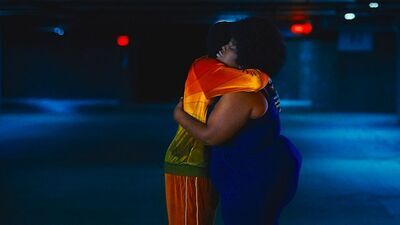It’s hard to write about this film without saying too much. The film played countless film festivals during the 2021-22 seasons and with good reason. It’s beautifully shot and easy to program, but at that time, it also offered a moment of catharsis for those who had deep feelings about the lack of physical, loving contact between humans during the pandemic. It’s a film that doesn’t outright tell you what it’s about, but you know what it’s about, even if its delivery might be a bit strange and ambiguous. The film opens with a shot of a girl’s hand on an elevator button and that hand being slapped away by another. Touch isn’t always healing, of course, but in Tenzis’ film, it’s everything.

Q&A with Christopher Tenzis:
How did you come up with this?
“Big Touch” was inspired by the hyperrealism of sculptor Ron Mueck whose subjects are people suspended in time by the weight of their emotions. Some of Mueck’s sculptures are gigantic, towering over the observer, and other times they’re so small that they need to be placed on a pedestal to be at eye level. I wondered if their size was in direct relation to their feelings; not that one felt more than another, but that the feelings themselves dictated their size. For example, a man was tiny because he felt marginalized and helpless, and a woman was huge because she was swelling with love yet had no place to put it. Then I wondered what would happen if Mueck’s creations could touch each other? Would they perhaps equalize in size because, for a moment’s relief, they would be reminded that they were not the sum total of the singularity of an emotion, but that they also had bodies with which to feel?

What was the casting process like for this?
There were many conversations during casting about how race could impact the film but we wouldn’t know until we found the right talent. Because the film was first and foremost about the universality of empathy through touch, finding a soulful cast who could communicate that theme was my priority. Raymond Ejiofor was the only person we looked at who not only understood the character, but could express the emotions with his body. Astra Marie Varnado, who plays Judy, our heroine, was the only one we saw who was bursting at the seams to express love. Suddenly, with Ray and Astra in place, the film took on new meaning. Years ago, I met Robert Altman at the Austin Film Festival and he said that he didn’t cast for what he wanted, he casted for what he didn’t know he wanted. So the palpability and sincerity of the symbolic narrative is evidence of trusting that process.

